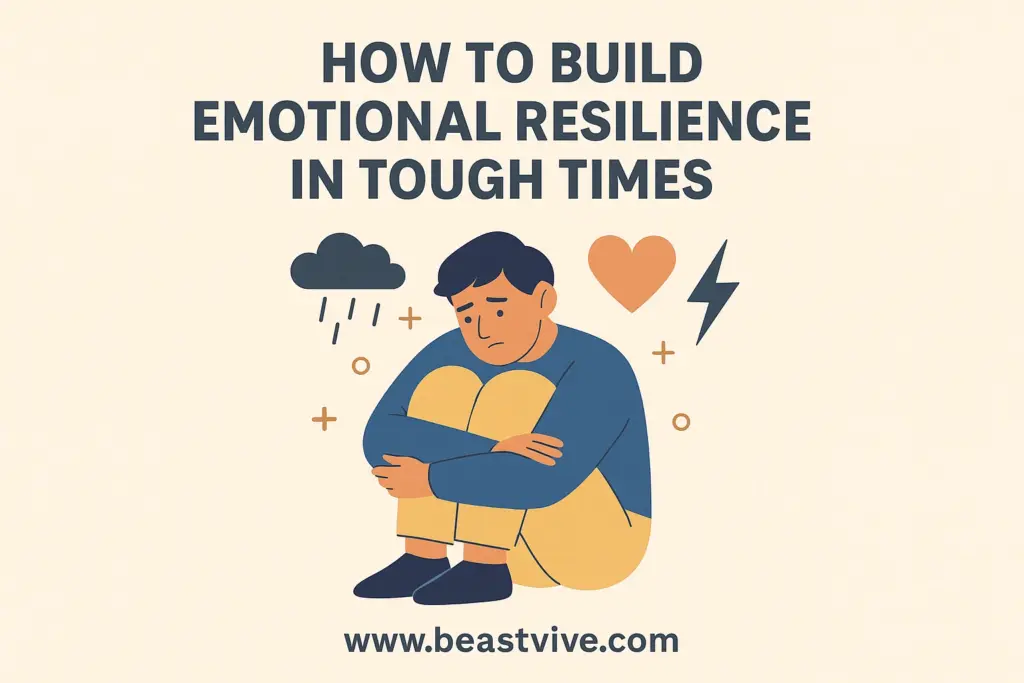
Life can be beautiful, but it can also be unbelievably hard.
Sometimes everything hits you at once — pressure from work, family issues, financial stress, heartbreak, or unexpected setbacks. It feels like the world is asking too much from you.
During moments like these, emotional resilience becomes your lifeline.
But let’s clear one thing up:
Emotional resilience isn’t about being “strong” all the time.
It’s not about pretending you’re okay.
It’s not about hiding your feelings.
It simply means this:
You bend, but you don’t break.
You fall, but you get back up.
You feel deeply, but you don’t give up.
And the best part?
Anyone can build emotional resilience — including you.
Let’s talk about how.
1. Allow Yourself to Feel What You Feel
You don’t need to “toughen up.”
You don’t need to pretend you’re fine.
Strong people still cry.
Strong people still get overwhelmed.
Strong people still ask for help.
When life hurts, let yourself feel it:
- Cry if you need to
- Sit quietly with your emotions
- Tell someone how you’re feeling
Suppressing emotions only makes them louder.
Accepting them gives them space to soften and move through you.
2. Take One Step at a Time (Don’t Overthink the Whole Future)
When things go wrong, the mind jumps into overdrive:
- “What if things get worse?”
- “How will I handle this?”
- “What if I fail?”
Suddenly, your brain is carrying the weight of the next 10 years.
Resilience doesn’t come from thinking far ahead.
It comes from focusing on today.
Tell yourself:
- “Let me get through today.”
- “Let me handle one thing at a time.”
Small steps are how big challenges are survived.
3. Focus on What You CAN Control
You can’t control the weather.
You can’t control someone else’s behavior.
You can’t control unexpected problems.
But you can control:
- Your attitude
- How you respond
- Your actions
- Your habits
- Your boundaries
Emotional resilience grows the moment you stop fighting what you cannot change.
4. Lean on People You Trust
You don’t have to walk through hard times alone.
Sometimes a single conversation — with a friend, sibling, parent, partner, or therapist — can lighten your heart more than you expect.
Talking doesn’t make you weak.
It makes you human.
And it reminds you that you don’t need to carry everything by yourself.
5. Speak Kindly to Yourself
Your inner voice matters more than you realize.
When things go wrong, it’s easy to say:
- “I’m failing.”
- “I’m not strong enough.”
- “I can’t handle this.”
But resilience grows when you change the voice in your head:
- “I’m trying, and that’s enough.”
- “I’ve been through hard things before — I’ll get through this too.”
- “This moment is tough, not permanent.”
Be your own biggest supporter, not your critic.
6. Build a Simple Daily Routine
During chaos, routine gives your mind a sense of control.
You don’t need a perfect schedule.
Just a few small anchors:
- Wake up around the same time
- Drink water first thing
- Move your body a little
- Eat something nourishing
- Sit quietly for 5 minutes
- Go to bed on time
A basic routine becomes emotional stability when everything else feels shaky.
7. Find a Purpose in the Pain
This is not about toxic positivity.
It’s not about saying “Everything happens for a reason.”
It’s about gently asking:
- “What is this teaching me?”
- “How is this shaping me?”
- “What am I learning about myself?”
Many people discover strength, courage, patience, and clarity through hardship — qualities they never knew they had.
Your tough times may reveal a version of you that is wiser and stronger.
8. Move Your Body (It Helps More Than You Think)
You don’t need a workout plan.
Just move a little:
- Walk
- Stretch
- Dance
- Do yoga
- Breathe deeply
Movement releases natural chemicals in your brain that lift your mood and reduce stress.
Even 10 minutes can transform how you feel.
9. Practice Gratitude — Even If It’s Hard
You don’t need to feel grateful for everything.
Just notice the small good things:
- A warm meal
- A sunset
- A friend who checked in
- A peaceful moment
- Your pet snuggling next to you
Gratitude shifts your mind from “everything is going wrong” to “something is still right.”
That shift alone builds resilience.
10. Pause Before Reacting
When emotions are high, take a moment:
- Breathe
- Step back
- Wait 10 seconds
This tiny pause can prevent:
- Arguments
- Emotional outbursts
- Regretful words
- Stress spirals
Silence is powerful.
It gives you space to respond — not react.
11. Remember: Tough Times Don’t Last Forever
It may feel like your world is stuck.
It may feel like this pain won’t end.
But every storm runs out of rain.
Tell yourself:
- “This moment is temporary.”
- “Things can change.”
- “Better days are coming.”
Hope is resilience.
Holding on is resilience.
Trying again is resilience.
12. Celebrate Your Small Wins
Resilience grows from little victories:
- Getting out of bed
- Eating a meal
- Sending that email
- Calming yourself down
- Showing up even when it’s hard
These are NOT small things.
These are proof of your strength.
Celebrate them.
They build your emotional muscles.
💛 Before You Go: You Truly Are Stronger Than You Realize
Emotional resilience isn’t something only “strong people” have.
It’s a skill — and you’re building it right now.
Every time you keep going…
Every time you calm yourself…
Every time you choose hope…
Every time you try again…
…you’re becoming more resilient.
You don’t have to be perfect.
You don’t have to have it all figured out.
You don’t need to feel strong every day.
Just take one step.
Then another.
Then another.
You are capable.
You are growing.
And you will get through this.
